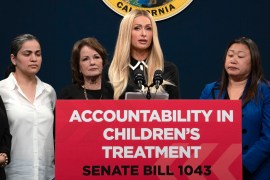Millions of Americans get subsidized health insurance under the Affordable Care Act. But those subsidies are being challenged. And in the coming weeks the Supreme Court could rule that in more than 30 states, the subsidies are illegal.
To find out what federal and state lawmakers could do if the subsidies disappear, we spoke to Linda Blumberg, a senior fellow at the Urban Institute, an economic and social policy think tank. This is a lightly edited transcript of the conversation.
AUDIE CORNISH, NPR: Tell us who would be most affected if the subsidies stopped flowing.
LINDA BLUMBERG, Urban Institute: These are not the poorest people, who were targeted to get help through the expansion of Medicaid. What we’re talking about here, people who are vulnerable to losing their assistance, are really working people, low-income and middle-income workers. The vast majority of them, over 80 percent , are the workers themselves. The rest are basically families of workers. Over 60 percent of them are white, over 60 percent of them live in the South. So we’re talking about a population that is working hard to make ends meet but can’t really do everything on their own. They’re also a voting population which I think is really important, too.
AUDIE CORNISH: So help us understand for a state leader, a governor, who is faced with a potential ruling here, what are the options? If they have a federal marketplace, can they switch to a state-based one?
LINDA BLUMBERG: There should be some opportunity to switch to a state-based one. The concern is we don’t know what’s going to be required in order to make that change. One of the big challenges, though, is if states have to take on a lot of new responsibilities then there may be a lot of costs for them to do that. The states that made the decision to do state-based exchanges early on had a lot of federal grants to set them up. Those grants don’t exist anymore. It’s also very time consuming. It took years for states to get these up and running. So, if a lot is required of these states to switch over, then there’s a lot of logistical and financial challenges.
AUDIE CORNISH: What about Congress? What options do they have to try and avoid potential chaos for some of these states?
LINDA BLUMBERG: Well, the most straightforward way to both avoid chaos and eliminate the problems of people losing their health insurance and premiums going up for everyone else is that they can extend the eligibility for the financial assistance to residents of all states, regardless of who’s administering their health insurance exchanges. That’s really the best way to address this.
AUDIE CORNISH: So they would just have to change the law, basically?
LINDA BLUMBERG: Right. Really, we’re talking about a couple of words in one sentence in the law that are in dispute here. So all they would have to do is take out a couple of words in one sentence in a thousand-page-plus law.
AUDIE CORNISH: Easy for you to say; what about the political will? Lawmakers have been fighting about this law for years.
LINDA BLUMBERG: I think the political will is the enormous challenge here. There’s going to be a real tension because there’s the side that says, “Listen, we don’t want to do anything to support the Affordable Care Act.” But the reality is that the folks in states that are likely to be affected are the ones that needed the most assistance. These are the states that are most likely to have high rates of uninsurance. We’re talking about a very low income population in many of these states and a highly vulnerable population that’s going to be affected.
This story is part of a reporting partnership that includes NPR and Kaiser Health News.







